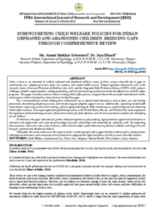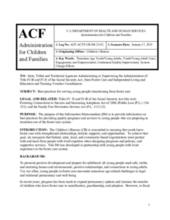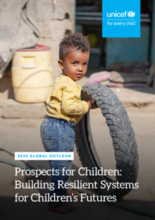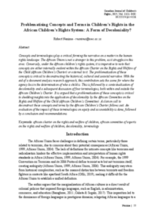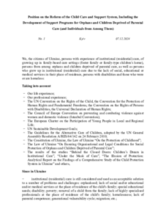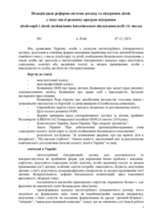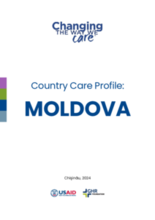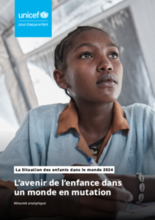Displaying 31 - 40 of 1797
This paper critically reviews India’s child welfare policies, highlighting how gaps in implementation, funding, and monitoring continue to leave millions of orphaned and abandoned children vulnerable despite existing legal frameworks. Drawing on international best practices, it proposes a shift toward family-based care, strengthened mental health and social work systems, technology-enabled monitoring, and greater child participation to build a more inclusive, child-centred welfare system.
The purpose of this Information Memorandum (IM) is to provide information on best practices for providing quality programs and services to young people who are preparing to transition out of the foster care system in the U.S.
Prospects for Children in 2025: Building Resilient Systems for Children’s Futures is the latest edition of the Global Outlook, a series of reports produced each year by UNICEF Innocenti – Global Office of Research and Foresight, which look to the key trends affecting children and young people over the following 12 months and beyond.
This article examines how key concepts and terminologies within and surrounding the African Charter on the Rights and Welfare of the Child shape narratives in the African human rights landscape, emphasizing the need to interrogate and deconstruct them through a decolonial lens. Using document analysis, it argues that critically problematising these terms is essential for strengthening the African Children’s Committee’s application of decoloniality and for advancing equity and accountability in child rights implementation.
This study examines how policy developments and the introduction of the Minor Protection (Alternative Care) Act, Chapter 602, have shaped the alternative care system and impacted the welfare and rights of children and families in Malta. It analyzes legislative intent, stakeholder perspectives, and gaps in practice, highlighting challenges and proposing reforms to strengthen the law’s implementation and support ongoing alternative care improvements.
In Ukraine, for the first time, individuals who have experienced institutional care, as well as those who have experience with family-based care, have united and agreed upon a common position regarding the reform of the child care and support system, including the development of programs to support orphaned children and children deprived of parental care.
В Україні вперше особи, які перебували в інституційних установах, а також ті, хто має досвід сімейного догляду, об’єдналися та узгодили спільну позицію щодо реформування системи догляду та підтримки дітей, у тому числі розвитку програм підтримки дітей-сиріт та дітей, позбавлених батьківського піклування.
In this webinar, the Independent Expert on the Enjoyment of Human Rights by Persons with Albinism, Muluka-Anne Miti-Drummond, shared findings from her recent report on children with albinism and the right to family life. Staff from UNICEF and NGOs in Madagascar, Tanzania, Malawi and Uganda also shared lessons learned.
This country care profile provides an overview of key lessons learned in the children’s care reform process in Moldova, including successes, challenges and areas for progress, and gaps in learning and best practice.
Pour ce faire, ce rapport examine trois grandes tendances, à savoir trois forces puissantes qui s’inscrivent dans la durée à l’échelle mondiale et qui auront de profondes répercussions sur la vie des enfants entre aujourd’hui et 2050: les changements démographiques, la crise climatique et environnementale et les technologies d’avant-garde.

